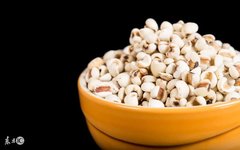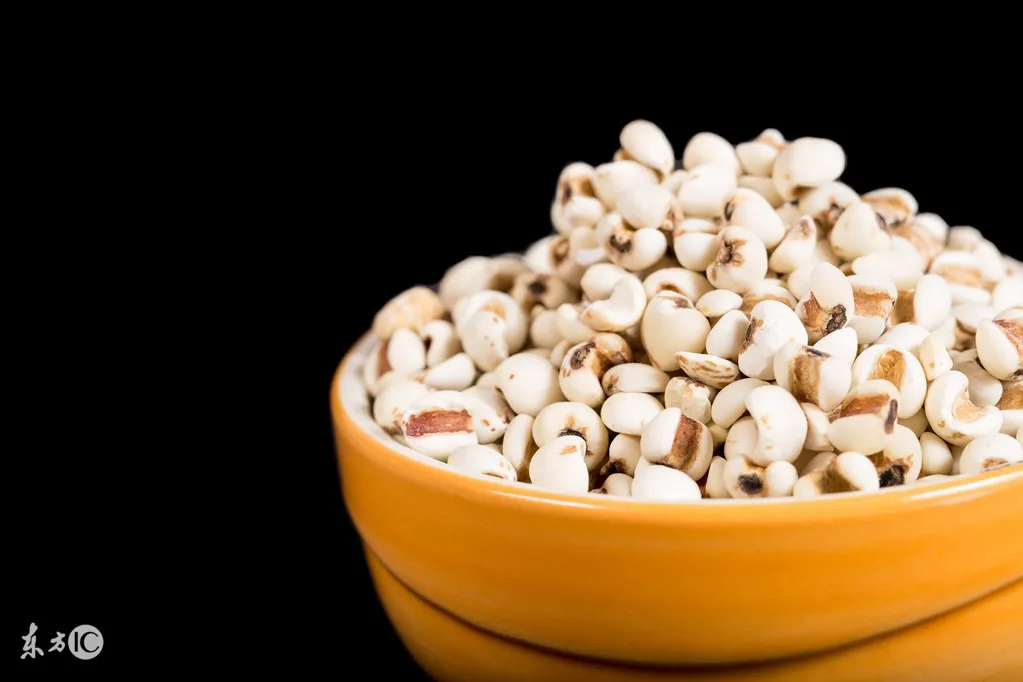
1. What are the Side Effects of Coix Seed?
Coix seed, also known as Yi Yi Ren (薏苡仁), Yi Mi, and other names, is a commonly used Chinese herb and a widely consumed food.
Coix seed is highly nutritious and is hailed as the “King of Gramineous Plants”.
The Shen Nong Ben Cao Jing classifies it as a superior herb, effective for treating dampness, benefiting the gastrointestinal tract, and reducing edema. It strengthens the spleen and benefits the stomach. Long-term consumption can promote vitality and energy. When prepared as a beverage, it has a fragrant taste and benefits the middle jiao. In summer, it can be boiled and consumed to warm the stomach and nourish qi and blood. Bathing newborns with it can help prevent illness.
Side Effects of Coix Seed:
1. Pregnant women and those menstruating should avoid coix seed. Additionally, individuals with a cold constitution should not consume it for extended periods; a month of consumption is acceptable.
2. When washing coix seed, it is important to gently rinse it with cold water without vigorous rubbing, then soak it in cold water for a while. The soaking water should be used for cooking to prevent nutrient loss. Due to its significant dampness-eliminating properties, it is not suitable for those with nocturnal emissions, frequent urination, or pregnant women.
3. Coix seed can cool the body, making it unsuitable for those with a cold constitution, especially pregnant women and those menstruating.
4. Coix seed contains high levels of viscous carbohydrates, so excessive consumption may hinder digestion.
5. Although coix seed can lower blood lipids and blood sugar, it is primarily a health food and should not be used as a medication. Patients with high blood lipid symptoms should seek medical treatment rather than self-medicate with coix seed.
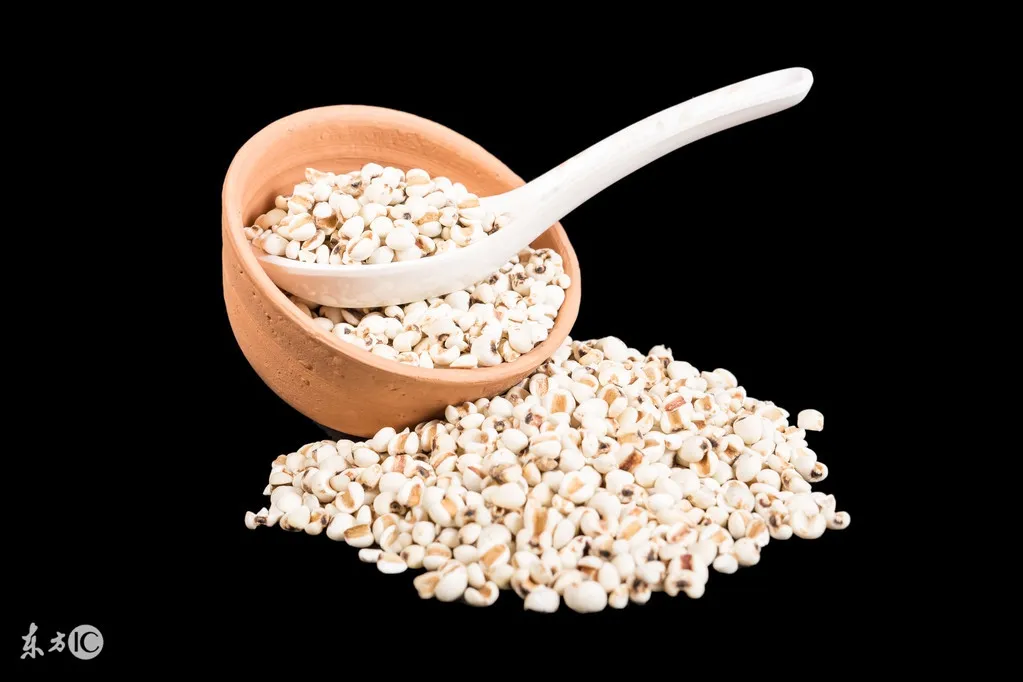
2. What are the Benefits of Coix Seed?
Properties: Sweet, bland, cool. Channels: Spleen, lung, kidney, stomach.
Main Functions: Strengthens the spleen, nourishes the lungs, clears heat, and promotes urination. It treats diarrhea, dampness obstruction, muscle spasms, edema, beriberi, lung abscess, intestinal abscess, and leukorrhea. Ben Cao: “It treats muscle spasms and dampness obstruction, and aids in breathing.” Bie Lu: “It eliminates dampness and benefits the gastrointestinal tract, reduces edema, and promotes appetite.” Yao Xing Lun: “It treats lung abscess and cough with purulent sputum.” Shi Liao Ben Cao: “It alleviates dry mouth and thirst.” Yi Xue Ru Men: “It treats shortness of breath and chest tightness.” Gang Mu: “It strengthens the spleen, benefits the stomach, clears heat, and overcomes dampness. Cooked rice treats cold qi; boiled drinks promote urination and relieve heat dysuria.” Guo Yao De Yao Li Xue: “It treats water retention in the stomach.” Zhong Guo Yao Zhi Tu Jian: “It treats pulmonary edema, damp pleurisy, urinary obstruction, chronic gastrointestinal diseases, and chronic ulcers.
Clearing Heat and Promoting Urination:
Coix seed is sweet and bland, with a mild cooling effect, making it effective for damp-heat in the three jiaos. It is best for thirst and short, red urination. Symptoms include: high fever, sweating, chills, chest pain, difficulty in breathing, cough with purulent sputum, dry mouth, irritability, yellow greasy tongue coating, and slippery rapid pulse. Coix seed is the first choice for clearing heat and promoting pus discharge.
Applications:
Edema, urinary difficulties, beriberi. This herb is bland and sweet, promoting urination and reducing swelling while strengthening the spleen. It is commonly used for edema and abdominal distension due to spleen deficiency and dampness, often combined with Fu Ling (Poria), Bai Zhu (White Atractylodes), and Huang Qi (Astragalus). For edema with shortness of breath, it can be cooked with the juice of Yi Li Ren (Sour Jujube) as food. For beriberi with swelling, it can be combined with Fang Ji (Stephania) and Mu Guo (Papaya).
For spleen deficiency diarrhea, this herb can eliminate spleen dampness, strengthen the spleen, and stop diarrhea, especially effective for diarrhea due to spleen deficiency and dampness, often combined with Ren Shen (Ginseng), Fu Ling, and Bai Zhu, such as in Shen Ling Bai Zhu San.
Dampness obstruction and muscle spasms. Coix seed can eliminate dampness and relieve obstruction, relaxing muscles and alleviating spasms. It is commonly used for damp obstruction with muscle spasms and pain, often combined with Du Huo (Angelica Pubescens), Fang Feng (Siler), and Cang Zhu (Atractylodes), such as in Coix Seed Decoction. For chronic damp obstruction, it can be cooked as porridge, such as in Coix Seed Porridge.
Lung abscess and intestinal abscess. This herb clears heat from the lungs and intestines, promoting pus discharge. For lung abscess with chest pain and cough with purulent sputum, it is often combined with Wei Jing (Reed), Dong Gua Ren (Winter Melon Seed), and Tao Ren (Peach Kernel), such as in Wei Jing Decoction. For intestinal abscess, it can be combined with Fu Zi (Aconite), Bai Jiao Cao (Herba Patrinia), and Dan Pi (Moutan Root), such as in Coix Seed, Aconite, and Bai Jiao Powder.
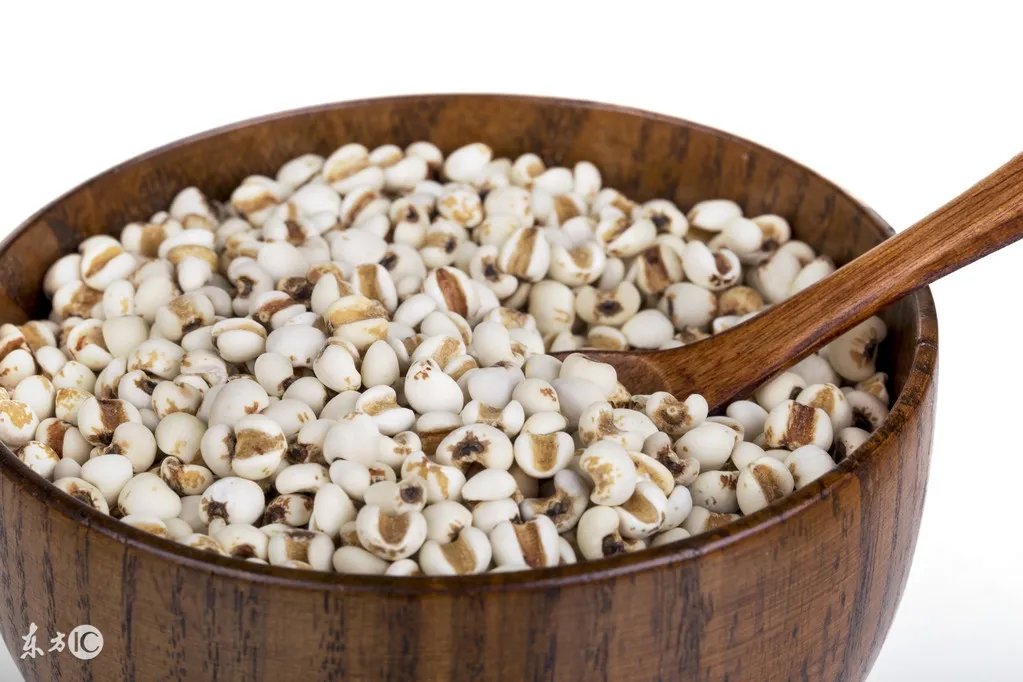
3. What are the Actions of Coix Seed?
Antipyretic, sedative, and analgesic.
Coix polysaccharides have a good antipyretic effect against fever caused by polysaccharides from bacteria; it has a weak central inhibitory effect and sedative effects on rats; its analgesic effect is similar in strength to aminopyrine.
Reducing muscle contraction.
Coix seed oil has an excitatory effect on frog striated muscle and motor nerve endings at low concentrations, while it has a paralyzing effect at high concentrations. The saturated fatty acids in coix seed oil can prevent or reduce the contraction of striated muscles, decreasing muscle spasms and shortening the fatigue curve. Its action point is not on the nerves but on the muscle.
Lowering blood sugar, blood calcium, blood pressure, and diuretic effects.
Subcutaneous injection of coix seed extract (coix seed oil) in rabbits can lower blood sugar and blood calcium levels. The water extract of coix seed, when injected into the abdominal cavity of mice, can significantly reduce blood sugar concentration, yielding three effective components: Coix Polysaccharides A, B, and C. These components can induce hypoglycemia in normal mice and alloxan-induced hyperglycemic mice. Intravenous injection of coix polysaccharides can temporarily lower blood pressure in rabbits. Coix seed oil has diuretic effects.
Enhancing immunity.
Using coix seed ester extracts containing triglycerides in marmots can significantly enhance IL-1 production in peritoneal exudate cells and stimulate macrophages to produce and secrete IL-1. It significantly enhances the ability of peripheral blood mononuclear cells in healthy individuals to produce antibodies, indicating that coix seed enhances humoral immunity.
Immunological effects.
Neutral polysaccharide mixtures are highly heterogeneous, and HPLC can separate seven polysaccharides, which are α-D-glucans with glucose side chains at positions 0-6 in the main chain. Each purified polysaccharide has different maximum absorptions in iodine reactions (530nm or >550nm), with >500nm polysaccharides being more effective than 530nm polysaccharides, indicating considerable anti-complement activity.
Acidic polysaccharides II a-1, 2, 3, IIb were further purified to yield anti-complement polysaccharides CA-1 and CA-2, containing 8-11% protein, with molecular weights of 160,000 and 70,000, respectively. At low doses, CA-2 shows stronger anti-complement activity than CA-1. 5. Anti-cancer effects. This herb and coix seed ester have inhibitory effects on sarcomas such as Sl80 and YAS, preventing proliferation and killing cancer cells.
Anti-tumor effects.
(1) Subcutaneous injection of coix seed ethanol extract in tumor-bearing mice can inhibit the proliferation of Ehrlich ascites carcinoma (EAC) cells, significantly prolonging the survival time of the animals. Two components further isolated from this extract cause cytoplasmic degeneration in cancer cells, while another component halts cell division in metaphase.
(2) The acetone extract of coix seed, when injected into the abdominal cavity of mice, can also inhibit EAC growth. This anti-tumor activity can be transferred to the petroleum ether-soluble acidic fraction, which, when injected subcutaneously, can make ascites transparent, with tumor cells nearly disappearing, although this fraction is also highly toxic. The acetone extract of coix seed also shows significant inhibitory effects on cervical cancer (U14) and ascitic liver cancer (HCA) solid tumors.
(3) Clinical applications of coix seed decoctions have shown effects in prolonging the life of late-stage cancer patients, and significant cytoplasmic degeneration of cancer cells was observed after abdominal injection of coix seed acetone extract. It was also found that the 50% ethanol extract of coix seed can promote keratinization of cultured squamous carcinoma cells.
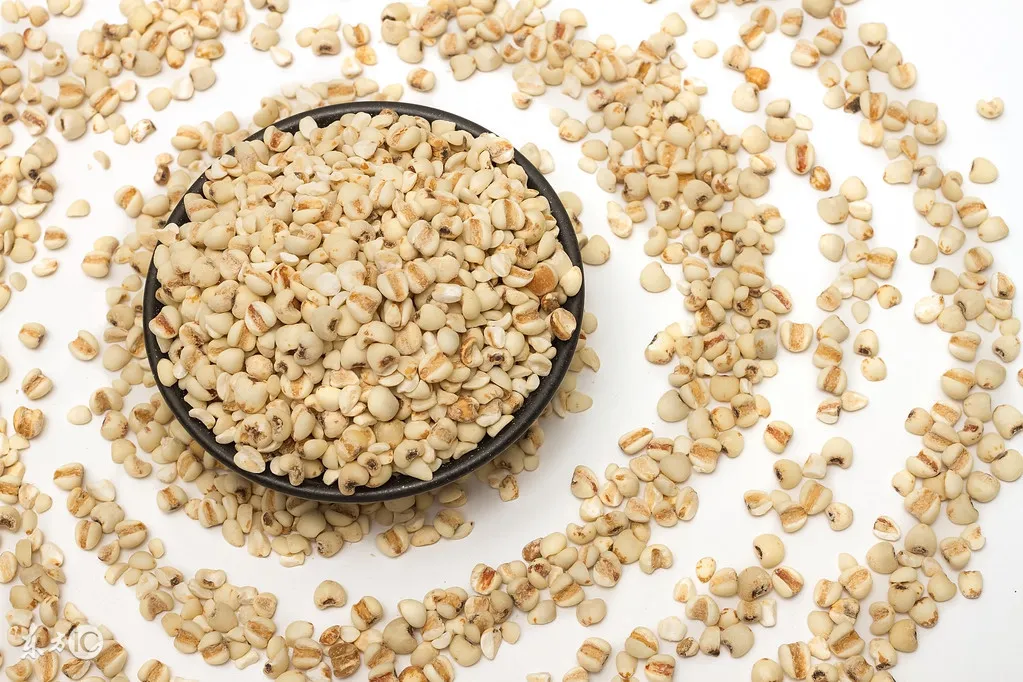
4. What are the Clinical Applications of Coix Seed?
Regarding the treatment of various fevers.
The classic Bai Hu Tang (White Tiger Decoction) consists of Shi Gao (Gypsum), Zhi Mu (Anemarrhena), Jing Mi (Semen Oryzae), and Gan Cao (Licorice), with clear roles for each ingredient. Bai Hu Tang and its derivatives have been used for over two thousand years and are effective for the first category of major diseases—fever. Although Jing Mi does not reduce fever, at some point, coix seed has replaced it. Pharmacological studies confirm that coix seed has a good antipyretic effect. Although its antipyretic effect is not as strong as Shi Gao or Zhi Mu, it can synergistically enhance the fever-reducing effects of the formula. In Wen Bing Tiao Bian, coix seed is used in formulas for summer heat and damp heat, serving to reduce fever and eliminate dampness. Currently, in clinical practice for various fevers, especially those caused by immune diseases, viral infections, cancer, heat stroke, and burns, coix seed is a necessary herb in the prescriptions based on Bai Hu Tang, used as an adjunct to enhance the fever-reducing effects of Shi Gao.
Regarding dampness treatment for joint and muscle pain.
The Shen Nong Ben Cao Jing and Jin Kui Yao Lue record that this herb primarily treats wind-damp pain. In clinical practice, coix seed is still commonly used for various types of arthritis with damp-heat. Although it has analgesic effects, they are not very strong; it can enhance the effects of the main herbs and reduce gastrointestinal discomfort caused by some wind-damp dispelling herbs. Due to its muscle-relaxing properties, it can treat muscle inflammation and soreness caused by overuse. Myositis, a challenging autoimmune disease, can be treated with traditional Chinese medicine. Based on my experience, I add herbs that reduce enzymes, such as Bai Jiao Cao, Hu Zhang, and Nu Zhen Zi, to the formula. After enzyme levels decrease, symptoms of muscle soreness and weakness can be treated. Coix seed has a muscle-relaxing and analgesic effect, enhancing the efficacy against muscle soreness and weakness. It can also be used in patients undergoing corticosteroid treatment.
Regarding strengthening the spleen and anti-cancer effects.
This herb has spleen-strengthening properties and is included in Shen Ling Bai Zhu San to strengthen the spleen and stop diarrhea, typically using cooked coix seed. This herb is also a supportive anti-cancer herb. In my clinical practice, when treating cancer with Sheng Ban Xia (Pinellia) and Sheng Nan Xing (Arisaema), I always use raw coix seed to enhance the anti-cancer effects of Sheng Ban Xia and Sheng Nan Xing while reducing their toxic side effects. For late-stage cancer patients and post-operative cancer patients, coix seed porridge can be prepared with red dates, ginseng, Huang Qi, and Ling Zhi, consumed 1-2 times daily, to support the body and combat cancer, improving symptoms and prolonging life.
Promoting water metabolism without diuretic effects.
This herb is generally classified as a diuretic in traditional Chinese medicine. However, both clinically and pharmacologically, it does not have diuretic effects; rather, it has anti-diuretic effects. How can this be understood? In traditional Chinese medicine, promoting water metabolism, eliminating dampness, and diuresis are related yet distinct concepts. This herb has the ability to strengthen the spleen, promote water metabolism, eliminate wind-dampness, clear damp-heat, and transform phlegm-dampness. The Ben Cao Gang Mu records that it “promotes urination and relieves heat dysuria,” which clearly pertains to urinary tract infections, falling within the scope of clearing heat and transforming dampness. It also records “eliminating edema” as a treatment for water retention. This can only be understood from the perspective of traditional Chinese medicine’s theory of strengthening the spleen and promoting water metabolism. According to traditional Chinese medicine theory, the lung, spleen, and kidney are the three sources of water, with the spleen being the central source. Sang Bai Pi (Mulberry Root Bark) can treat water retention from both upper and lower sources through phlegm transformation and diuretic effects. Bai Jie Zi (White Mustard Seed) can transform water from upper and middle sources, treating pleural and abdominal effusions without diuretic effects, as the effusion is resolved through promoting microvascular reabsorption. Fu Ling has only a weak diuretic effect, and its water-promoting and damp-eliminating effects are related to regulating water-salt metabolism. Therefore, what is the positioning and mechanism of coix seed in transforming dampness, promoting water metabolism, and reducing swelling? It may be through the middle jiao, eliminating inflammation, improving vascular permeability, and facilitating the reabsorption of accumulated fluid; or it may be that coix seed contains rich nutrients that enhance digestive function, improve protein absorption and synthesis in the body, and correct mild hypoproteinemia, thus facilitating fluid reabsorption.
Remember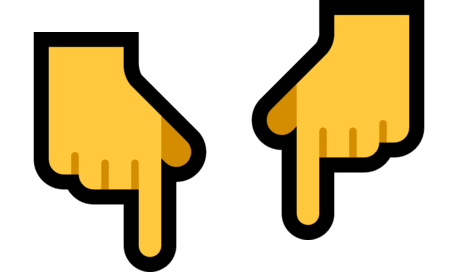 Follow us!
Follow us!
Editor’s Recommended Articles
1.Is a tooth mark on the tongue a sign of spleen deficiency? No wonder you are always unwell; there are actually three other reasons.
2. A comprehensive guide to eight types of spleen and stomach issues including bloating, stomach pain, cold stomach, gastritis, and excessive dampness.
3. Six key points to know when taking prednisone (prednisolone) for safe use.
4. Raising Yang is the best way to strengthen the spleen; learn a method to raise Yang, eliminate dampness, and replenish the postnatal essence.
Like is a form of encouragement Share to spread joy.

